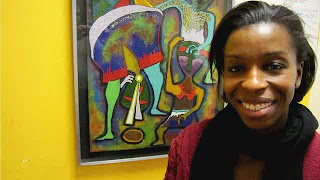To Noo Saro-Wiwa, he was Dad. Rather a distant dad, though; for most of her childhood, she saw him only three or four times a year, on his regular visits to England (where she lived with her mother, brothers and twin sister), and during the long summer holidays at the family home in Port Harcourt, where her father lived.
Also, he wasn't always the perfect dad. Certainly not that day in 1990, when the 14 year-old Noo received a phone call from her uncle out of the blue. He revealed that when Noo was to visit to Nigeria that summer, she and her siblings would have two new friends to play with: their half-sisters.
"He got his brother to tell us about them," she says. "About this whole 'other family' he had. They were eight and six by the time we learned they even existed. We were shocked, angry. We felt betrayed. Less valued. Now I see it differently. But at the time …"
Poised and perceptive, Noo, 35, has written a book – as funny and affectionate as it is honest and, frankly, alarming – about her first prolonged visit to her homeland since that summer 20 years ago.
At that point, she says, she and her siblings had rebelled: "For years, we'd been dragged back there for two months every summer. We just said, enough is enough."
And after Ken Saro-Wiwa was executed by the country's military dictatorship in November 1995, of course, there was even less of an incentive to return. Nigeria, says Noo, became a repository of all her pain, fears, disappointments and resentments, a place "where nightmares come true". It took time to go back – as it has taken time for her to reappraise her father.
Before he became a world-renowned activist, Ken was "a true polymath", she says. "He had an almost manic energy. He saw potential everywhere. He was a writer, he had interests in retail, property, the media …"
"As a young child, you of course have little sense of him," says Noo. "He was just this great, energetic, moustachioed presence, with fantastic bedside stories and always lots of presents and chocolates. And permanently with his pipe. When I was very young, I used to think every black man I saw with a moustache was him."
Gradually, though, her parents' marriage began to show signs of strain, noticeable – if not understandable – even to a child. Noo's mother, never particularly pleased at her exile to England, where she spent 17 years working at a Job Centre, became increasingly unhappy, sometimes tearful; rows erupted, during Ken's visits, over clothes bought "for cousins"; her father grew more and more distant.
Back in Surrey, Noo says she and her brothers and sister were "shielded from a lot of what went on in the time leading up to the execution. My mother shielded us. We knew he was being locked up, but you know … Nigeria is the kind of place where people do spend time in prison."
African Herald Express


No comments:
Post a Comment